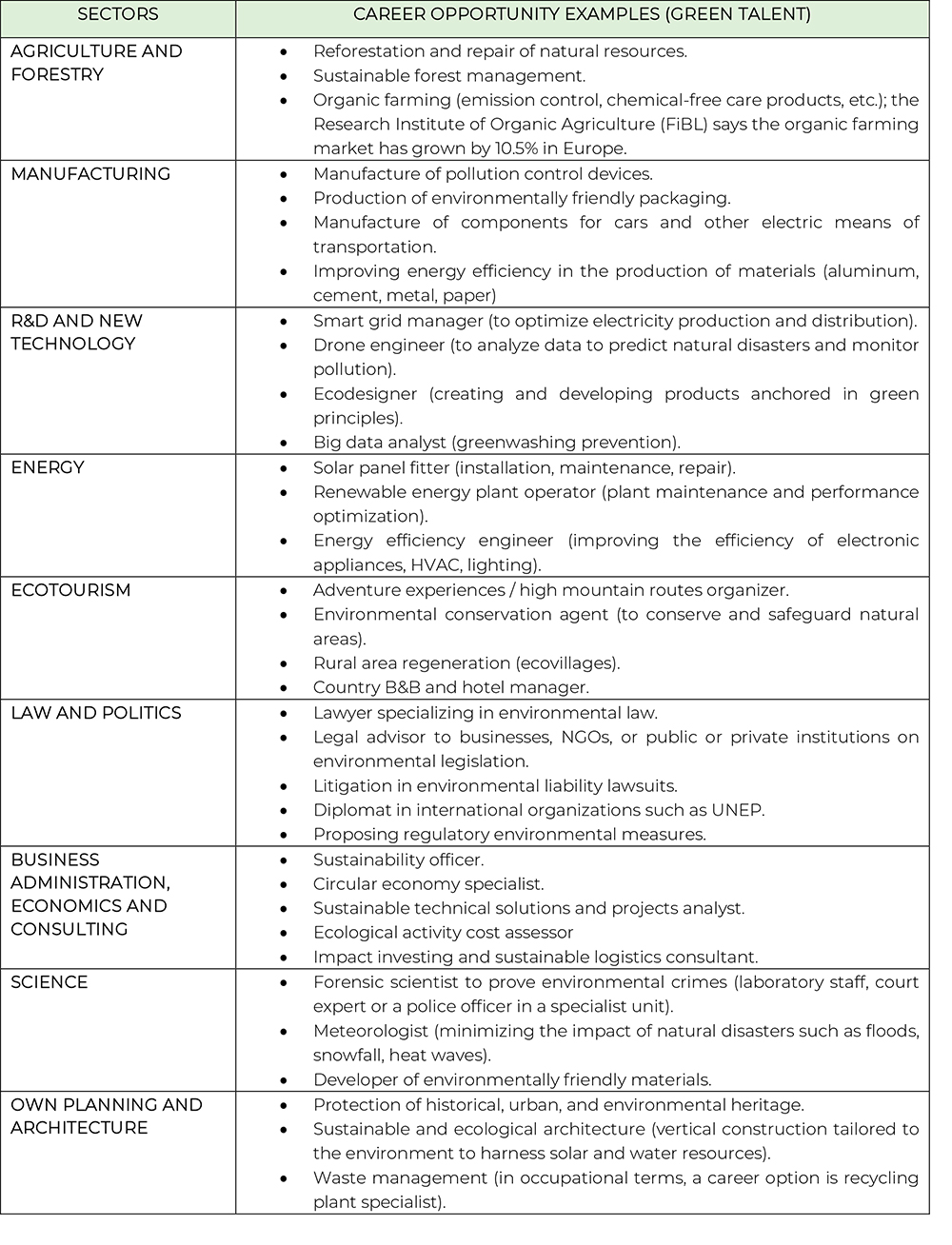Green jobs, as defined by the United Nations Environment Program, are those that offer decent work that contributes substantially to preserving or restoring environmental quality. This can include safeguarding ecosystems and biodiversity, cutting down on energy, material and water usage, decarbonizing the economy, and preventing or at least minimizing the creation of waste and pollution – and it can cover a large number of occupations that are technical, scientific, administrative, academic, or service-related. What is particularly to important note, however, is the use of the word decent. To be green and sustainable, jobs must not only combat the climate crisis, but also respect the rights of workers by providing adequate wages, safe conditions, career prospects, and lifelong learning.
The arrival of regulatory frameworks, policies, and financial support for those working in green jobs is demonstrative of the significant impact the green transition will have on the labor market. Furthermore, to marshal support for a clean and circular economy, the European Green Deal, which aims to make Europe climate neutral by 2050, has announced a list of employment creation opportunities that includes the development of low-emission technologies and sustainable products and services, decarbonizing and revamping energy-intensive industries (steel, chemicals) and resource-intensive sectors (textiles, electronics), and the production of verifiable information to mitigate greenwashing.
The International Labor Organization (ILO) released a briefing note that argues that the transition to a green economy will bring with it a number of new jobs. Eurostat reports that between 2012 and 2018, employment tied to the circular economy grew by 5% (four million jobs). These jobs will cater to specific needs such as pollution control. Certain existing jobs will be replaced – for example, jobs in the fossil fuel industry will dwindle because of this transition. Some jobs will disappear, such as producing certain kinds of packaging materials, while other employment including builders, electricians, and architects will be transformed and repurposed for eco-efficiency.
The following table shows some of the career opportunities for green talent:
There is a wide range of sectors and career opportunities for green talent in diverse industries so there is no single training profile. Nevertheless, there are indexes such as the Green General Skill Index which identifies four groups of work areas that are particularly important for green occupations:
- Engineering and technical skills. These competencies related to design, construction, and technology assessment are generally mastered by engineers and technicians and are critical in eco-building projects, renewable energy design, and energy-saving research and development.
- Scientific skills. These competencies derive from wide-ranging bodies of knowledge and are essential for innovation activities such as physics and biology. These skills are in high demand at each stage of the value chain, particularly in the utilities industry, which delivers basic services such as water, sewerage, and electricity.
- Operations management skills. These skills are in relation to how organizational structure will transform with the influx of green activities, and they are important for sales engineers, climate change analysts, sustainability specialists, sustainability managers, and transportation planners.
- Monitoring skills. These competencies are necessary for accurately assessing compliance with technical criteria and legal standards and are used by environmental compliance inspectors, nuclear monitoring technicians, emergency managers, and paralegals.
And, of course, a range of soft skills – such as the ability to work in a team, communication skills, a penchant for innovation – are gaining in importance and the green jobs expand.
Spain, for example, recently passed the Climate Change and Energy Transition Law and section 35 sets out some exciting ideas for “Education and Training on Climate Change.” It argues that the Spanish education system should be “engaged in the response to climate change by increasing knowledge about climate change and its consequences, delivering training for low-carbon and resilient technical and professional activities to address climate change, and taking on the necessary personal and social responsibility.” These training needs stem from an increase in labor demand in this sector. An Infoempleo and UNIR Report on Employment in Sustainability and the Environment estimates that Spain will generate 1.13 million green jobs, but this calls for investment in sustainable transport, green infrastructure, and renewable energies. The National Institute of Statistics’ data suggests that jobs in environmental stewardship and natural resource management currently account for just 2.2% of Spain’s GDP, and mainly consist of industrial and service companies engaged in pollution control, renewable energy production, water treatment, and waste management.
Against this background, investing in green industries in order to generate jobs in the abovementioned sectors could unlock and support green talent across Europe – as could projects that partner with universities to which empower young Europeans to act against climate change, as is the case with the 1Planet4All. It should come as obvious that environmental education is a priority for the development of this green talent and should be included systemically in curricula, not only as a crosscutting subject but as an additional competency. Furthermore, teachers at all levels should receive training throughout their career.
Meeting the future demand for a robust and talented green workforce will entail cross-collaboration and investment from corporates, universities, and government institutions alike. Not only must a concerted effort be made to identify creating green job opportunities and reskilling the workforce to fill and excel in those positions, but the youth must be empowered to actively participate in the building of this labor market. It is our future.
A version of this article ran in Spanish on esglobal.
© IE Insights.









